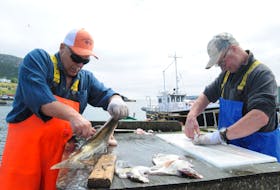They huddled around a cellphone screen, steeling themselves for the possibility that Premier Stephen McNeil would break his word.
Those 60 Pictou Landing residents were preparing Friday morning for another betrayal and that the province would continue to allow Northern Pulp to contaminate their harbour.
But they watched in disbelief as the premier, almost 200 kilometres away in Halifax, made good on his commitment to Pictou Landing five years ago, pledging that Northern Pulp would stop pumping effluent into Boat Harbour on Jan. 31. That end date written in the Boat Harbour Act would not be extended.
Brian Hebert, the community’s lawyer who negotiated the act with the province, was among the local gathering. He had made the trip from his Dartmouth home. For a few moments he was also in a state of disbelief over the premier’s announcement. The feeling subsided and the group shared in the magnitude of the moment.
“When the significance of what had happened started to sink in there was a real sense of validation, that as a people their rights were finally being validated,” said Hebert. “As I watched them it was such a refreshing change for them. It was really moving to be a part of.”
The community is finally on track to righting an injustice spanning five decades. An injustice carried out by the federal government and successive provincial governments. Back in 1967, the federal government granted the province the right to pollute Boat Harbour, dismissing the community’s riparian rights to have its historical fishing grounds kept intact. Successive mill owners were permitted to use Boat Harbour as an effluent dumping ground.
“So on Friday there was this incredible sense of what this moment meant to the people,” said Hebert. “The work that they had done, the work that I had done was validated. It comes with a new start for the community.
“When you have no choice but to live somewhere and you can’t control your environment, that wears you down, it leads to a lot of mental health issues. Someone is ... kicking you while you’re down and you want it to stop and then someone finally stepped in and said you’re not going to be able to bully these people anymore.”
"There was such a sense of disbelief and when the significance of what had happened started to sink in there was a real sense of validation, that as a people their rights were finally being validated."
- Brian Hebert, lawyer for Pictou Landing
Herbert credited the premier for showing tremendous courage. His decision to deny the mill an extension resulted in Northern Pulp announcing that it would cease operations. That means hundreds of mill jobs will be lost and hundreds more eliminated in the forest sector.
“The pressure that he must have been under to do this, essentially to keep a promise with a very small First Nation community, was enormous.
“He honoured his commitment and the story of Boat Harbour cries out for someone to step in and do justice. The history of the promises and the broken promises, it’s a really cruel story.
“I can’t even explain how devastating this would have been had the premier gone back on his word. I would have been afraid for people’s mental health.
I would have been very concerned that some people would have taken this very hard.”
Like Pictou Landing Chief Andrea Paul, Hebert said he’s concerned for the workers affected by the mill’s impending closure. But Hebert said it never had to come to this.
He blamed Northern Pulp for unduly delaying the process of securing environmental approval for its proposed effluent treatment plant. In the five years allotted by the province, the company simply failed to provide the scientific evidence needed to back up its plan to send treated effluent from the mill into the Northumberland Strait.
“We still don’t know what the impact of the treatment facility would be on the Northumberland Strait and that’s the tragedy of this,” said Hebert. “If the science is done properly, it might turn out that the impact isn’t great and there isn’t a problem putting it there.
“But the thing is, we just don’t know that because the way it was done wasn’t satisfactory. Northern Pulp is the one that is responsible to do the homework.”
In the end, Hebert said most of the credit goes to Pictou Landing leadership. The community, led by Chief Paul and council, was determined to get justice. It succeeded.
“Chief Andrea Paul is just an amazing person, very, very skillful and it comes from her culture of openness, that sense of what’s right and wrong and never wanting to take a step that she couldn’t justify in front of the community,” said Hebert. “There were no secret discussions of any kind. The whole community spoke through council and the chief and it was that unity that allowed them to prevail.”
Related:
- Nova Scotia sticks with Boat Harbour deadline, mill to close
- 'Dark day': Pictou County braces for Northern Pulp closure
- Rally in Pictou Landing urges premier to honour Boat Harbour Act
- Hundreds rally outside Province House to keep Northern Pulp mill running
- Northern Pulp will close without Boat Harbour extension, mill's parent company says
- Northern Pulp says its future at risk after environment minister's decision on effluent plant assessment
- BACKGROUND: Expected Northern Pulp, Boat Harbour decisions come after years of controversy
- TIMELINE: A post-colonial history of Boat Harbour









